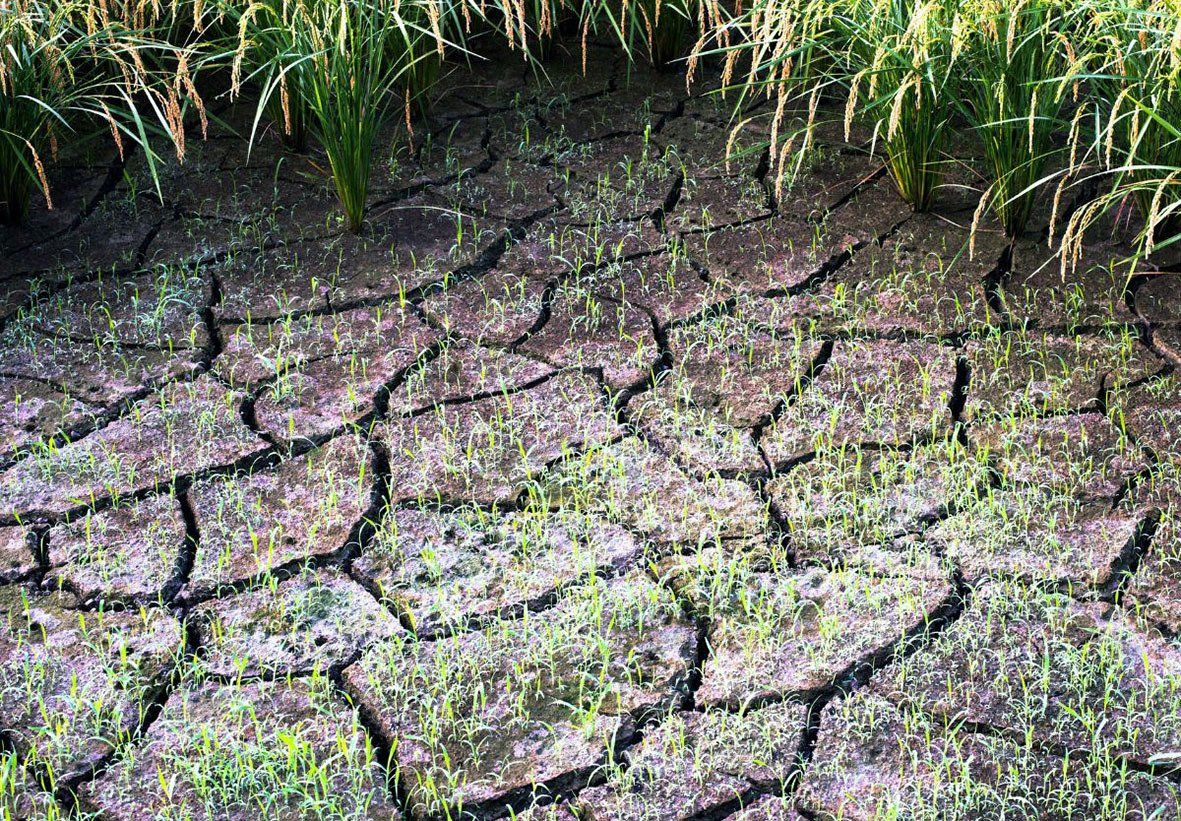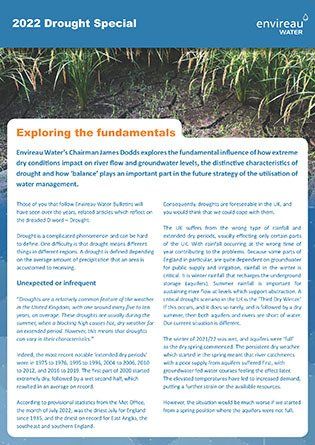2022 - Drought Special
Envireau Water’s Chairman James Dodds explores the fundamental influence of how extreme dry conditions impact on river flow and groundwater levels, the distinctive characteristics of drought and how ‘balance’ plays an important part in the future strategy of the utilisation of water management.
Those of you that follow Envireau Water Bulletins will have seen over the years, related articles which reflect on the dreaded D word – Drought.
Drought is a complicated phenomenon and can be hard to define. One difficulty is that drought means different things in different regions. A drought is defined depending on the average amount of precipitation that an area is accustomed to receiving.
Unexpected or infrequent

“Droughts are a relatively common feature of the weather in the United Kingdom, with one around every five to ten years, on average. These droughts are usually during the summer, when a blocking high causes hot, dry weather for an extended period. However, this means that droughts can vary in their characteristics.”
Indeed, the most recent notable ‘extended dry periods’ were in 1975 to 1976, 1995 to 1996, 2004 to 2006, 2010 to 2012, and 2016 to 2019. The first part of 2020 started extremely dry, followed by a wet second half, which resulted in an average on record.
According to provisional statistics from the Met Office, the month of July 2022, was the driest July for England since 1935, and the driest on record for East Anglia, the southeast and southern England.
Consequently, droughts are foreseeable in the UK, and you would think that we could cope with them.
The UK suffers from the wrong type of rainfall and extended dry periods, usually effecting only certain parts of the UK. With rainfall occurring at the wrong time of year contributing to the problems. Because some parts of England in particular, are quite dependent on groundwater for public supply and irrigation, rainfall in the winter is critical. It is winter rainfall that recharges the underground storage (aquifers). Summer rainfall is important for sustaining river flow at levels which support abstraction. A critical drought scenario in the UK is the ‘Third Dry Winter.’ If this occurs, and it does so rarely, and is followed by a dry summer, then both aquifers and rivers are short of water. Our current situation is different.
The winter of 2021/22 was wet, and aquifers were ‘full’ as the dry spring commenced. The persistent dry weather which started in the spring meant that river catchments with a poor supply from aquifers suffered first, with groundwater fed water courses feeling the effect later. The elevated temperatures have led to increased demand, putting a further strain on the available resources.
However, the situation would be much worse if we started from a spring position where the aquifers were not full.
Types of Droughts
Droughts can be characterised as follows. A water resources (Hydrological) droughts refers to a shortage of water in the hydrological system. This includes significantly reduced levels of water in groundwater, reservoirs, rivers and streams. Developing slowly over extended periods, they can cover extensive areas and impact the surrounding areas for months and years. These are at the extreme end.
Agricultural droughts occur when dry soil affects crop growth. The lack of rainfall leads to a decline in soil moisture affecting pastures and rain-fed crops. Agricultural drought is particularly susceptible to high temperatures and drying winds, which greatly increase soil moisture deficit, leading to crop failure if irrigation is not applied.
Ecological droughts occur when water levels fall to a point where there is direct or sustained impact on the environment, such as fish getting trapped in ephemeral pools.
A fourth type occurs when water is available, but there is a lack of infrastructure to get it into supply due to system failure, maintenance, or a lack of investment. This is characterised as an engineering drought. Taking the Thames Water desalination plant out of commission at the exact time it is needed, is a good example.
Future strategy
To look for solutions to droughts, one must consider two-time scales. The immediate and the future. The immediate drought problem is determined by the weather, whether it is raining or not and how hot it is. The future incorporates climate change and how frequent and severe droughts in the future, may get. The solutions to the two scenarios are vastly different.
The immediate problem demands control, audacity, and the utilisation of groundwater or other stored water. Ultimately groundwater is our largest, easily accessible volume of stored water.
The future requires an alternative strategy. It requires a rational, cautious approach to water resources management and the challenges encountered. It commands strong national, political and regulatory leadership, with significant extreme political bravery. Water resources management in wet times and dry times is about balance. A balance between dissimilar needs, the necessities of domestic water supplies, industrial supply, irrigation; the needs of rivers, to support ecology and amenity use; the requirements of fisheries and fishing. The list continues. That balance is by no means equal and each sector will view their priorities differently. The balance also changes depending on the weather.
Whilst irrigators will be concerned when it stops raining, the supply of drinking water is essential. Additionally, while watering the garden may be a necessity for some, balancing water resources for irrigation is crucial to food supplies. Whereas ecology can withstand a short duration of stress, prolonged drought will result in continued multiyear or decadal stress.
Achieving balance is extremely difficult, requiring expensive infrastructure and long-term commitment.
This ongoing extended dry period is a drought in certain parts of the country. In the immediate term, it requires regulatory courage. If the water is present, some abstractors need to be allowed to access it for a brief period of time. It will rain and aquifers will be recharged, in all probability, we will be complaining about flooding in October.
An alternative approach is required for the future - that of political bravery. The courage to lead, to listen and to learn. The fortitude to make challenging decisions, and the audacity to invest in the country’s future.
Envireau Water is an RSK Group Company.








